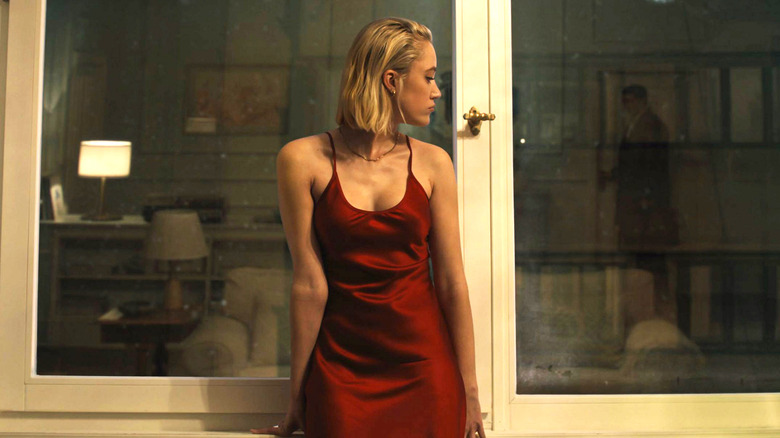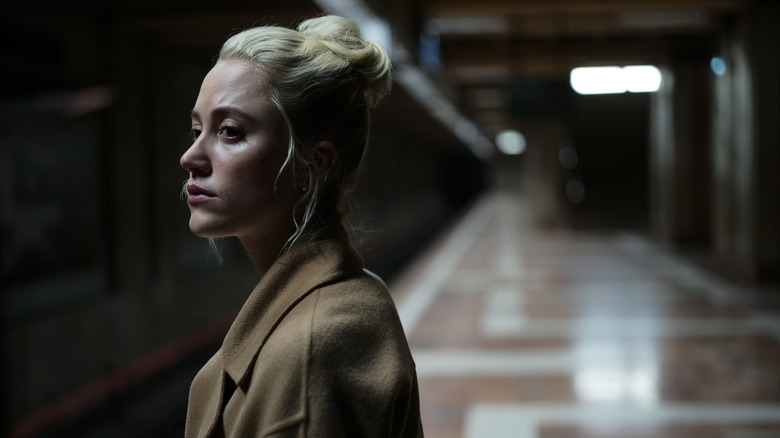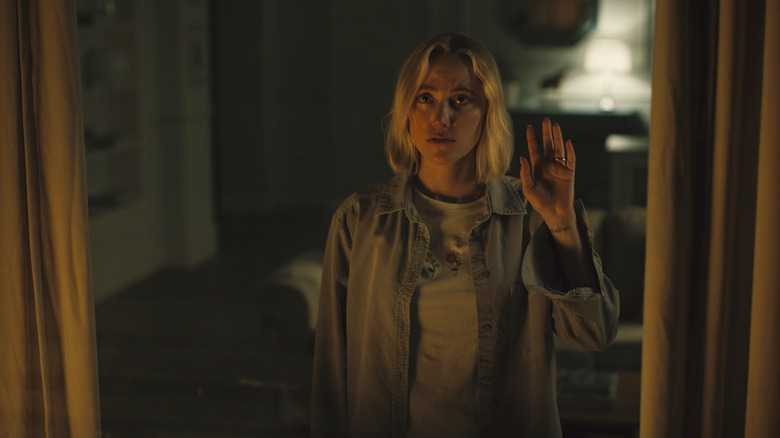Watcher Review: A Must-See Thriller
- Retains a constant sense of tension throughout.
- Maika Monroe is brilliant in the lead role.
- Chloe Okuno's visuals are both beautiful and narratively satisfying.
- It takes just slightly too long with certain sequences.
The best practitioners of thriller cinema know how to extract maximum tension not just from major set pieces, but from the seemingly passive moments that lurk in between. Hitchcock did it, De Palma does it, Spielberg and Fincher have mastered it, and yet it remains a deceptively simple-seeming portion of directorial craft. The best thrillers squeeze and stretch their audiences with a glance, or a lingering moment of quiet that leads to nothing but another lingering moment, or a slow walk down a city street. It's about potential energy as much as it is about the actual, kinetic moments of the tension breaking into something else.
With "Watcher," her new thriller starring a magnetic Maika Monroe as a stranger in a new city dealing with an often-passive sense of terror, Chloe Okuno has proven she has the capacity to be one of our finest thriller filmmakers. With just a few characters, a stripped-down setting, and a somewhat familiar scenario, Okuno maximizes tension with every frame of her feature directorial debut, delivering one of the most tense movie experiences you're likely to have this year.
New city, familiar fears
Directed by Okuno and written by Zack Ward, "Watcher" sets out from the beginning to cultivate a feeling of unease, and it starts with Julia (Monroe) arriving in a strange city where she doesn't speak the language. Her husband Francis (Karl Glusman) is right at home in Bucharest, in the country of his family's origins, but Julia begins the journey at a disadvantage. She struggles to adjust to the language, to the pace of the city, and to the rising fears around her of a serial killer known as the Spider, who's just claimed another victim and seems to be targeting young women like her.
Still, for her own sake and her husband's, Julia makes an effort to acclimate. She befriends a neighbor in her apartment building, she goes shopping, she even goes out to the movies as she tries to learn the language and culture around her. But even beyond the general discomfort of adjusting to a new city and a new country, something seems off. A dark figure seems to be watching her, boring into her with his eyes from the building across the street. He could just be people watching, or staring blankly out his own window, but what if he isn't? What if he's also the man (Burn Gorman) she's started to notice at the supermarket, at the movies, on the train? What if she's already stuck in the Spider's web, and she doesn't even know it yet?
It's the kind of plot that could drive directly into full-on slasher territory very quickly, as Julia watches people around her drop like flies while constantly thinking she'll be next, but Okuno and Ward don't take that approach. Instead they pull back to a carefully maintained distance, following Julia's inner tension and fear as much as any external circumstances that might influence it. We're not watching a film about someone stalking a woman; we're watching a film about a woman who believes she's being stalked, and Okuno makes sure we know the difference by making Julia the sole intimate focus of the film. She has a husband, she has friends, she has other people she interacts with, but we never feel like we know them, just as Julia feels like they might not believe her when she says something is wrong. What we do know is Julia, thanks to Okuno's careful, elegant camerawork that places her in frame as a lonely observer, perhaps the only person who can see the world the way she does in a uniquely terrifying moment in her life. The film's compositions alternate between showing Julia as a small figure against the vastness of an alien cityscape and showing Julia as a figure trapped in a gilded cage, closed in on all sides by the luxury of her apartment and the freedom of her lifestyle, yet without the escape hatch she actually needs. It's a brilliantly structured film that creates a sense of constant emotional tension at its core.
A watchful woman
Okuno's carefully engineered thriller landscape depends upon Monroe to sell the intimate fear that settles into the film almost immediately, and in that respect Monroe delivers what might be the best performance of her career to date. The film is called "Watcher" not just because Julia feels she's being watched, but because she herself is a watchful eye, the one person in the sphere of her own life who seems to actually be paying attention to what she sees as the walls are slowly closing in around her. Monroe plays this very particular brand of terror with a fierce blend of determination, vulnerability, and frustration, and her ability to convey each of those feelings simultaneously is what sustains the film's sense of tension. A key thriller element present throughout "Watcher" is a certain sense of ambiguity, a feeling that Julia really could have misinterpreted something, somewhere, that has made her essentially terrified for no reason. As an audience, we have to know that, but we also have to know that Julia believes to her core that she's right, and that there's terror not just in that knowledge, but in what might happen to her if she's wrong. Monroe is able to convey that, sometimes with a single look. It's a powerhouse performance.
Of course, the less said about the actual conclusions present in "Watcher," the better. Though its structure is certainly reminiscent of other thrillers that have come before it (there are traces of "Rear Window," "Rosemary's Baby," even De Palma's "Blow Out" and "Body Double"), the film works because of its ability to keep the viewer engaged in an almost constant sense of dread through sheer force of craft, until by the third act you genuinely aren't sure what's about to happen even if you're convinced you've seen a dozen films like this before. That sense of uncertainty, of true tension, is what makes "Watcher" a gripping, beautifully executed new entry in the thriller canon.
"Watcher" is in theaters June 3 and on demand June 21.


